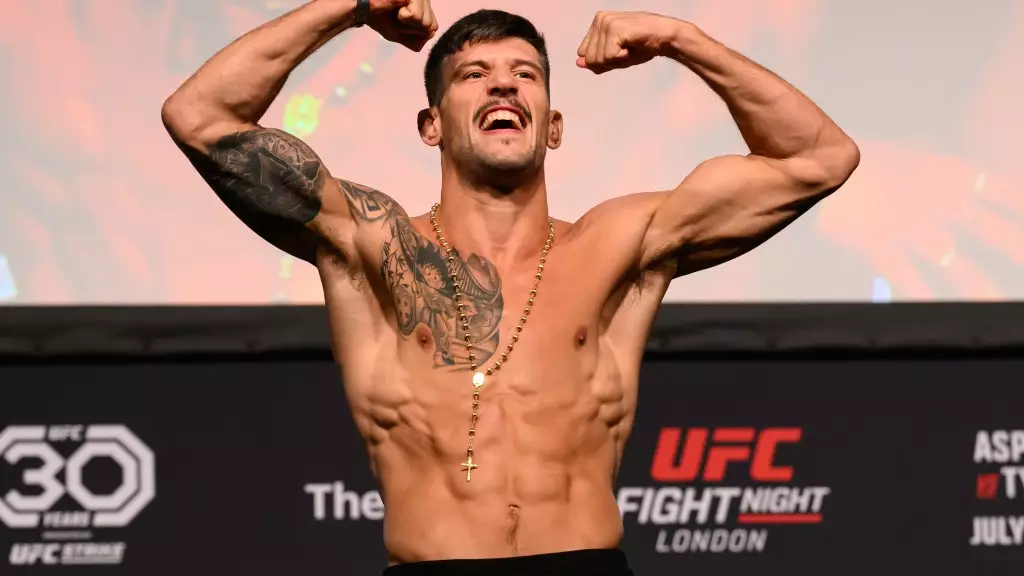As mixed martial arts (MMA) continues to grow in popularity, fighters must navigate the complexities of weight divisions and the toll that rigorous weight cuts can take on their health and performance. One fighter currently facing this dilemma is Joel Alvarez. Competing in the competitive lightweight division at UFC on ESPN 63, the Spaniard is re-evaluating his future in this weight class. With aspirations for improved performance and a concern for his well-being, Alvarez appears poised to make the transition to welterweight after his upcoming fight against Drakkar Klose.
Alvarez, with an impressive record of 21 wins and only 3 losses, has developed a reputation as a formidable fighter. Despite his success, the realities of weight management have proven to be a significant hurdle. Competing in the lightweight division, where the maximum weight limit is 155 pounds, has forced Alvarez to undertake substantial cuts. Standing at a towering 6’2” and weighing around 185-190 pounds naturally, the weight cuts can be grueling and unsustainable. He candidly acknowledges that this lifestyle is not conducive to consistent fighting.
Alvarez’s commentary sheds light on the struggle many fighters face when cutting weight. Depleting the body of resources to meet weight limits not only impacts performance but also poses long-term health risks. As Alvarez admits, those substantial cuts often lead to a taxing final week filled with dehydration and extreme measures to make weight. While he has successfully hit the mark in recent bouts, the cumulative strain of weight cuts continues to weigh heavily on his mind.
One compelling factor driving Alvarez’s decision to consider a move to welterweight is his desire for increased fight frequency. He articulates a wish to stay active within the cage, a goal that has been impeded by the demanding nature of cutting down to lightweight. A lack of availability for fights due to extended preparation for weight management can hinder a fighter’s career momentum and overall development. Alvarez reflects upon the need for longer training camps to allow for safe weight cuts, leaving him unavailable for opportunities that arise with shorter notice.
Transitioning to welterweight could alleviate some of these burdens. By competing at around 170 pounds, Alvarez hopes to reframe his training and fighting schedule, which would allow him to take more fights without the added stress of extreme weight management. This adjustment reflects a broader trend in MMA where athletes prioritize health and natural weight classes over rigid adherence to a given division.
The health concerns associated with aggressive weight cutting are critical in Alvarez’s decision-making process. Fighters often find themselves in precarious situations, pushing their bodies to the limit for the sake of competition. Alvarez’s words reflect a growing awareness in the MMA community about the need to address these issues. The grueling process of shedding weight rapidly can lead to dehydration, nutrient deficiencies, and long-term physiological impairment.
Alvarez recognizes the potential health ramifications of his current weight-cutting practices. As an athlete who has maintained a good fitness level, he views the necessity of weight cutting as counterintuitive to his overall health and wellness. Striking the right balance between performing optimally and preserving health is paramount. Moving to a higher weight class could allow him to enhance his strength and resilience in fights while minimizing health risks.
While the octagon is known for its fierce competition and the relentless pursuit of victory, the human aspect of fighting must not be overlooked. For fighters like Joel Alvarez, analyzing their career trajectories, personal health, and performance capabilities is essential. By considering a move to welterweight, Alvarez is not only making a tactical shift but is also prioritizing his long-term health and professional aspirations. As fighter awareness grows about the implications of weight management on performance and well-being, Alvarez’s journey serves as a reminder of the need for adaptations within the sport, fostering a healthier environment for current and future fighters. The next fight may not just be about winning but also about cultivating a sustainable career that paves the way for future generations in MMA.

